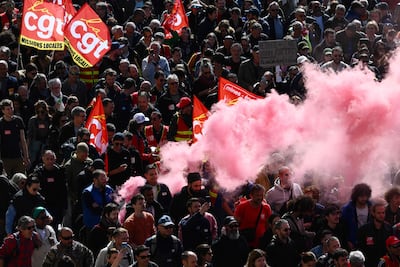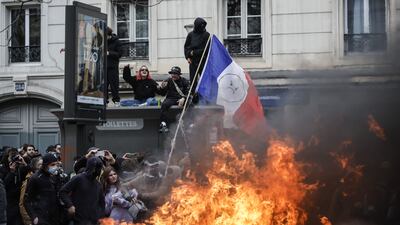Violent clashes have erupted as tens of thousands of people took to the streets in France to protest against President Emmanuel Macron's pension reforms.
Tuesday was the 10th day of action since protests began in mid-January against pension reform plans which would raise the retirement age from 62 to 64.
In Paris, police fired tear gas and launched a charge after some people at the head of the protest, dressed in black with their faces covered, started a fire.
Protesters in Nantes threw projectiles at security forces who responded with tear gas. Water cannon was used against demonstrators in Lyon, and in Lille police fired tear gas at protesters.
Interior Minister Gerald Darmanin said 13,000 members of the security forces were being deployed on Tuesday, 5,500 of them in Paris alone. The number, a record, was justified by "a major risk to public order".
At least 22 people were arrested in the capital by the afternoon, Paris police said.
Protesters delayed trains at Gare de Lyon station in Paris, walking on the rails and lighting flares in what they described as a show of solidarity for a railway worker who had lost an eye in a previous protest.
Mr Macron had been urged to make a peace gesture to protesters on Tuesday as unions staged another round of strikes.
Mr Macron was accused of “playing a dangerous game with democracy” by refusing to yield on his pension reform bill.
Strikes caused transport chaos as workers carrying flares blocked train tracks in Paris. Walkouts in the energy sector have left some petrol stations short of fuel.
Interior Minister Gerald Darmanin said an unprecedented 13,000 police and security officers were called up for Tuesday’s strikes.
Protesters want Mr Macron to withdraw a bill raising France’s retirement age from 62 to 64.
The bill was forced through parliament without a vote after Mr Macron failed to persuade a majority of MPs. He says the reform is necessary to cut the rising costs of France’s welfare state.
The government and opposition have accused each other of failing to offer a compromise.
There are suggestions Prime Minister Elisabeth Borne could offer tweaks to the pension law that ease the impact for older workers and people in physically demanding jobs.
But unions are calling for the entire bill to be delayed and renegotiated, even as Mr Macron wants it to take effect this year.
“The deep social crisis that already existed in our country has been coupled with a democratic crisis. We need to calm things down,” Yvan Ricordeau of the CFDT union told French television.
He said the union was proposing to “take several months to go back over the issue with common sense, and show that there are alternatives to working to 64”.

Mathilde Panot, the leader of a left-wing group in parliament, said the chaos was “putting France to shame” on the international stage.
“Emmanuel Macron is playing an extremely dangerous game with democracy,” she said.
Sebastien Chenu, the far right National Rally MP, said Mr Macron had “started fires” and was the “number one person responsible” for the unrest.
The unrest forced Mr Macron to ask Britain’s King Charles III to postpone a state visit that was planned for this week.
Allies of the president say opposition leaders have failed to condemn the violence that took place at some protests.
“Some people are coming in flocks to cause havoc and call our republic into question,” said Charles Rodwell, an MP from Mr Macron’s centrist bloc.
“I am convinced of the merits of this reform, but those who want to show their opposition must be able to do it in calm and security.”
One poll published on Monday showed Mr Macron’s approval rating at just 28 per cent, the lowest since the height of the Yellow Vest protests in 2018.
Another survey suggested the president’s centrist bloc would come third with 22 per cent of the vote if new elections were called to break the impasse.
The National Rally and a coalition of left-wing parties would be tied on 26 per cent, the poll predicted.
France’s constitutional council has yet to decide on the bill after opponents filed objections that could, in theory, lead to a referendum.


